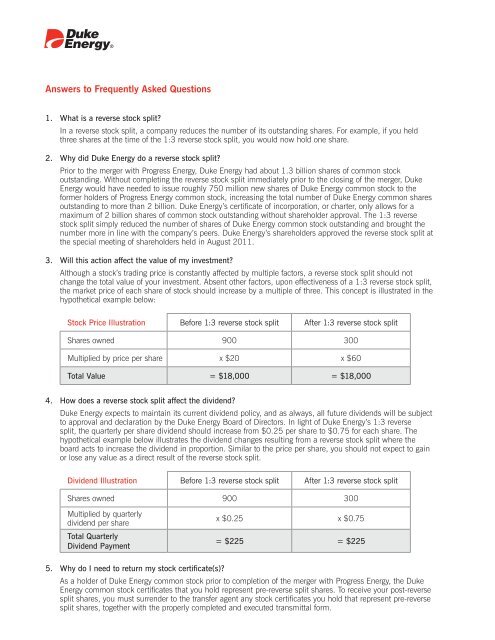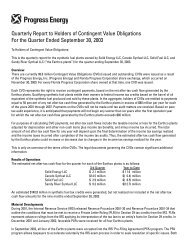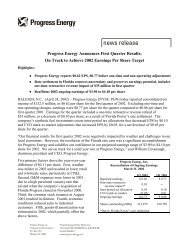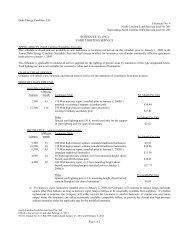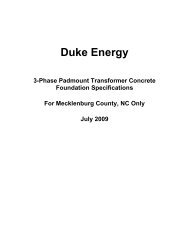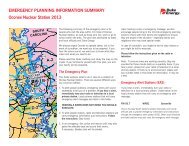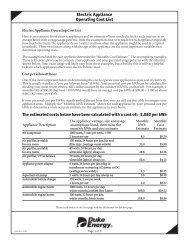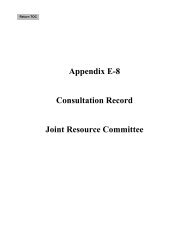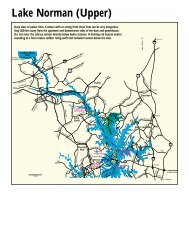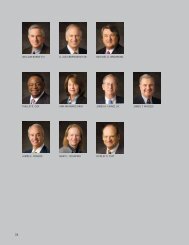Answers to Frequently Asked Questions - Duke Energy
Answers to Frequently Asked Questions - Duke Energy
Answers to Frequently Asked Questions - Duke Energy
Create successful ePaper yourself
Turn your PDF publications into a flip-book with our unique Google optimized e-Paper software.
<strong>Answers</strong> <strong>to</strong> <strong>Frequently</strong> <strong>Asked</strong> <strong>Questions</strong><br />
1. What is a reverse s<strong>to</strong>ck split?<br />
In a reverse s<strong>to</strong>ck split, a company reduces the number of its outstanding shares. For example, if you held<br />
three shares at the time of the 1:3 reverse s<strong>to</strong>ck split, you would now hold one share.<br />
2. Why did <strong>Duke</strong> <strong>Energy</strong> do a reverse s<strong>to</strong>ck split?<br />
Prior <strong>to</strong> the merger with Progress <strong>Energy</strong>, <strong>Duke</strong> <strong>Energy</strong> had about 1.3 billion shares of common s<strong>to</strong>ck<br />
outstanding. Without completing the reverse s<strong>to</strong>ck split immediately prior <strong>to</strong> the closing of the merger, <strong>Duke</strong><br />
<strong>Energy</strong> would have needed <strong>to</strong> issue roughly 750 million new shares of <strong>Duke</strong> <strong>Energy</strong> common s<strong>to</strong>ck <strong>to</strong> the<br />
former holders of Progress <strong>Energy</strong> common s<strong>to</strong>ck, increasing the <strong>to</strong>tal number of <strong>Duke</strong> <strong>Energy</strong> common shares<br />
outstanding <strong>to</strong> more than 2 billion. <strong>Duke</strong> <strong>Energy</strong>’s certificate of incorporation, or charter, only allows for a<br />
maximum of 2 billion shares of common s<strong>to</strong>ck outstanding without shareholder approval. The 1:3 reverse<br />
s<strong>to</strong>ck split simply reduced the number of shares of <strong>Duke</strong> <strong>Energy</strong> common s<strong>to</strong>ck outstanding and brought the<br />
number more in line with the company’s peers. <strong>Duke</strong> <strong>Energy</strong>’s shareholders approved the reverse s<strong>to</strong>ck split at<br />
the special meeting of shareholders held in August 2011.<br />
3. Will this action affect the value of my investment?<br />
Although a s<strong>to</strong>ck’s trading price is constantly affected by multiple fac<strong>to</strong>rs, a reverse s<strong>to</strong>ck split should not<br />
change the <strong>to</strong>tal value of your investment. Absent other fac<strong>to</strong>rs, upon effectiveness of a 1:3 reverse s<strong>to</strong>ck split,<br />
the market price of each share of s<strong>to</strong>ck should increase by a multiple of three. This concept is illustrated in the<br />
hypothetical example below:<br />
S<strong>to</strong>ck Price Illustration Before 1:3 reverse s<strong>to</strong>ck split After 1:3 reverse s<strong>to</strong>ck split<br />
Shares owned 900 300<br />
Multiplied by price per share x $20 x $60<br />
Total Value = $18,000 = $18,000<br />
4. How does a reverse s<strong>to</strong>ck split affect the dividend?<br />
<strong>Duke</strong> <strong>Energy</strong> expects <strong>to</strong> maintain its current dividend policy, and as always, all future dividends will be subject<br />
<strong>to</strong> approval and declaration by the <strong>Duke</strong> <strong>Energy</strong> Board of Direc<strong>to</strong>rs. In light of <strong>Duke</strong> <strong>Energy</strong>’s 1:3 reverse<br />
split, the quarterly per share dividend should increase from $0.25 per share <strong>to</strong> $0.75 for each share. The<br />
hypothetical example below illustrates the dividend changes resulting from a reverse s<strong>to</strong>ck split where the<br />
board acts <strong>to</strong> increase the dividend in proportion. Similar <strong>to</strong> the price per share, you should not expect <strong>to</strong> gain<br />
or lose any value as a direct result of the reverse s<strong>to</strong>ck split.<br />
Dividend Illustration Before 1:3 reverse s<strong>to</strong>ck split After 1:3 reverse s<strong>to</strong>ck split<br />
Shares owned 900 300<br />
Multiplied by quarterly<br />
dividend per share<br />
Total Quarterly<br />
Dividend Payment<br />
x $0.25 x $0.75<br />
= $225 = $225<br />
5. Why do I need <strong>to</strong> return my s<strong>to</strong>ck certificate(s)?<br />
As a holder of <strong>Duke</strong> <strong>Energy</strong> common s<strong>to</strong>ck prior <strong>to</strong> completion of the merger with Progress <strong>Energy</strong>, the <strong>Duke</strong><br />
<strong>Energy</strong> common s<strong>to</strong>ck certificates that you hold represent pre-reverse split shares. To receive your post-reverse<br />
split shares, you must surrender <strong>to</strong> the transfer agent any s<strong>to</strong>ck certificates you hold that represent pre-reverse<br />
split shares, <strong>to</strong>gether with the properly completed and executed transmittal form.
6. How should I return my s<strong>to</strong>ck certificate(s)?<br />
You may use the enclosed courtesy-reply envelope <strong>to</strong> return your pre-reverse split <strong>Duke</strong> <strong>Energy</strong> common<br />
s<strong>to</strong>ck certificates and your properly completed and signed Transmittal Form. Please do not sign your s<strong>to</strong>ck<br />
certificates. It is recommended that you insure the certificates for 2% of their market value at your expense<br />
and send them <strong>to</strong> either address provided below:<br />
If using first class or registered mail:<br />
<strong>Duke</strong> <strong>Energy</strong> Corporation<br />
Inves<strong>to</strong>r Relations Department<br />
P.O. Box 1005<br />
Charlotte, NC 28201-1005<br />
If sending by overnight courier:<br />
<strong>Duke</strong> <strong>Energy</strong> Corporation<br />
Inves<strong>to</strong>r Relations Department<br />
526 S. Church Street, EC01W<br />
Charlotte, NC 28202<br />
7. What will happen if I do not return my s<strong>to</strong>ck certificates?<br />
Until you return your pre-reverse split <strong>Duke</strong> <strong>Energy</strong> common s<strong>to</strong>ck certificates for exchange, you will not<br />
receive the post-reverse split shares issuable with respect <strong>to</strong> your pre-reverse split shares. Any future dividends<br />
paid on <strong>Duke</strong> <strong>Energy</strong> common s<strong>to</strong>ck represented by your unsurrendered certificates will be held for you in<br />
your account, without interest, and will be paid <strong>to</strong> you when your pre-reverse split s<strong>to</strong>ck certificates have been<br />
properly returned and exchanged for your post-reverse split shares.<br />
8. What if I am unable <strong>to</strong> locate my s<strong>to</strong>ck certificates?<br />
If you are unable <strong>to</strong> locate your s<strong>to</strong>ck pre-reverse split <strong>Duke</strong> <strong>Energy</strong> common s<strong>to</strong>ck certificates, you may<br />
complete the Affidavit of Lost, S<strong>to</strong>len and Destroyed S<strong>to</strong>ck Certificates, conveniently located on your Transmittal<br />
Form. Please be sure <strong>to</strong> have each owner sign his or her name in the presence of a notary public. Additionally,<br />
please return a check for your replacement bond premium payment, made payable <strong>to</strong> Aon Risk Services in the<br />
amount equal <strong>to</strong> $0.40 per pre-reverse split share (minimum of $10.00). If you are unable <strong>to</strong> locate your s<strong>to</strong>ck<br />
certificates, you will not receive post-reverse split shares until you have returned your completed Transmittal Form<br />
with your signature(s) properly notarized AND your check for the replacement bond premium payment.<br />
9. May I transfer the shares in<strong>to</strong> a different name?<br />
You may change the registration of the post-reverse split shares of <strong>Duke</strong> <strong>Energy</strong> common s<strong>to</strong>ck by completing<br />
Box A and obtaining a Medallion Signature Guarantee from one of the following institutions having membership<br />
in an approved medallion signature guarantee program: a commercial bank, a savings and loan, a credit union or<br />
a member of the New York S<strong>to</strong>ck Exchange having an office or correspondent in the United States.<br />
10. What will I receive after I have returned my documentation?<br />
Once all of your correctly executed documentation has been received, <strong>Duke</strong> <strong>Energy</strong> will exchange your prereverse<br />
split <strong>Duke</strong> <strong>Energy</strong> common s<strong>to</strong>ck certificates and issue <strong>to</strong> you the appropriate number of post-reverse<br />
split shares of <strong>Duke</strong> <strong>Energy</strong> common s<strong>to</strong>ck electronically in <strong>Duke</strong> <strong>Energy</strong>’s Direct Registration System (DRS).<br />
<strong>Duke</strong> <strong>Energy</strong> will provide you with a statement reflecting the number of shares registered in your account.<br />
11. May I receive a s<strong>to</strong>ck certificate representing my post-reverse split shares of <strong>Duke</strong> <strong>Energy</strong> common s<strong>to</strong>ck?<br />
Yes. You may send a written notice <strong>to</strong> our office requesting a s<strong>to</strong>ck certificate representing your post-reverse<br />
split shares of <strong>Duke</strong> <strong>Energy</strong> common s<strong>to</strong>ck. For your convenience, you may use the reverse side of the <strong>to</strong>p<br />
portion of your statement. Upon receipt of your request, we will mail a s<strong>to</strong>ck certificate <strong>to</strong> you at the mailing<br />
address listed on your account.<br />
12. I own other pre-reverse split shares of <strong>Duke</strong> <strong>Energy</strong> common s<strong>to</strong>ck which are held in the Inves<strong>to</strong>rDirect<br />
Choice Plan and/or the Direct Registration System (DRS). What action must I take <strong>to</strong> exchange those shares<br />
for post-reverse split shares?<br />
There is no action you need <strong>to</strong> take <strong>to</strong> receive the post-reverse split shares of <strong>Duke</strong> <strong>Energy</strong> common s<strong>to</strong>ck in<br />
exchange for your pre-reverse split shares held through the Inves<strong>to</strong>rDirect Choice Plan or the DRS. All shares<br />
held in the Inves<strong>to</strong>rDirect Choice Plan or the DRS will be exchanged au<strong>to</strong>matically. When the exchange is<br />
complete, you will receive a statement indicating the number of post-reverse split shares of <strong>Duke</strong> <strong>Energy</strong><br />
common s<strong>to</strong>ck registered in your account.


